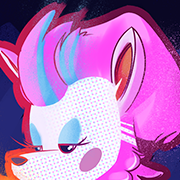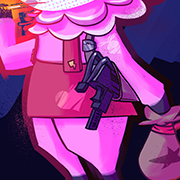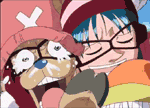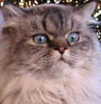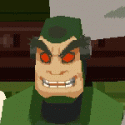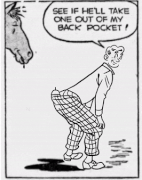|
I got a Surface 3 with one of the pens a few weeks ago. On a lark I want to use it to try to learn to draw something more complicated than bad stick figures (and this odd cartoon bull my high school math teacher taught me 15 years ago  ). Is any particular software geared toward that sort of use case that I should look into to Just Draw A Thing, or does it kinda depend on what sort of things/style I want to draw? Or am I in the wrong thread entirely to ask that? ). Is any particular software geared toward that sort of use case that I should look into to Just Draw A Thing, or does it kinda depend on what sort of things/style I want to draw? Or am I in the wrong thread entirely to ask that?(Coming from the technical background of a computer programmer... oh god not having a clear starting point on what I don't know and therefore not knowing what I'm gonna be doing wrong is the worst thing  ) )
Ciaphas fucked around with this message at 21:16 on Jul 30, 2015 |
|
|
|

|
| # ? Jun 9, 2024 11:31 |
|
If you're just looking for a suitable drawing/sketching software, Autodesk Sketchbook Pro is probably the standard right now. Photoshop and stuff like Manga Studio can do that but they have a ton of extra features so they're more suited for longer, more involved projects. Whenever I just want to draw some poo poo, I usually open Sketchbook first and then take it from there if I want to get crazier with it.
|
|
|
|
I think learning art digitally is a less than ideal approach because of the display. Everything is backlit with LEDs, so the contrast is different from graphite under natural light. Aside from that, you can achieve a lot of interesting effects digitally. I would advise against dumping money into digital tools for the sake of learning art, but if your hardware happens to be capable of making art, then go for it.
|
|
|
|
mutata posted:If you're just looking for a suitable drawing/sketching software, Autodesk Sketchbook Pro is probably the standard right now. Photoshop and stuff like Manga Studio can do that but they have a ton of extra features so they're more suited for longer, more involved projects. Whenever I just want to draw some poo poo, I usually open Sketchbook first and then take it from there if I want to get crazier with it. Being lightweight on tools is fine by me, this poo poo is nothing more than a lark anyway. Looks like the basic version of Sketchbook is free on my Surface, so I'll roll with that for now. Thanks! I can already tell this is the sort of thing that might drive me slightly nuts, so I'll ask now: does the purchased version have layers, or is that more the domain of Illustrator or Manga Studio? i drew a cactuar, i'm proud like a four year old child (edit) Nevermind it appears the free "but sign up on autodesk.com first" version has layers Ciaphas fucked around with this message at 04:26 on Jul 31, 2015 |
|
|
|
Besides "draw a thing" and "practice a lot" I'm beginning to realize not only do I not know where to start, but despite reading the OP I don't really know what there is to start ON or what's most important to learn first. 
|
|
|
|
Ciaphas posted:Besides "draw a thing" and "practice a lot" I'm beginning to realize not only do I not know where to start, but despite reading the OP I don't really know what there is to start ON or what's most important to learn first. If your goal is: "I want to get better as fast as possible" then you need to draw from life. You can argue about techniques or what to focus on or almost anything else, but the drawing from life thing is pretty much the one thing pretty much everyone agrees on. Basically get started by drawing things around the house, people, your dog. Choose whatever is available to you. Can get a mirror do self portraits, crumple some paper bags and draw those, look at the house across the street through a window, etc. What you draw doesn't matter, it's the work you put in that does. Focus on accuracy first when you draw. Try to see relationships in terms of proportion and placement of all the parts of the object you are drawing. To help you with this, you can learn measuring techniques to help you check your work and find errors. Here's one video that has a few http://www.proko.com/drawing-measuring-techniques/. Also pay attention to negative space (that is the space between objects) as that can also be pretty handy for checking the accuracy of your work. Another thing to focus on is form and light. If you want your image on the paper to look three dimensional, getting the correct values (dark to light) on the correct planes (sides) is really important. Look up value spheres to get a basic idea of how to approach it for a simple object, those same ideas will also help you with more complicated objects. There are a lot of online tutorials and videos on the subject so you can use those to your advantage. You don't have to learn everything about light right away but it's something you should always be mindful of as you draw. When you draw ask yourself where the primary light source is (you can cheat and use a shadow box or a darkened room with one lamp) and then think about what planes will get the most light, and which will get a little less, and which will get even less than that, etc, so on. Don't sweat mistakes and don't feel like you have to rush. It's not about making good drawings at the start, it's about building your skills and training your eye. There is plenty of other stuff to learn that's really important and useful, construction and perspective for instance, but you don't have to tackle those just yet. I'd personally just focus on observational drawing for now. Also if you have some extra cash and time, Community Colleges and Art Centers usually have life drawing classes and those are really nice for developing your skills. So if you are able to attend one, I'd strongly recommend it.
|
|
|
|
Ciaphas posted:Besides "draw a thing" and "practice a lot" I'm beginning to realize not only do I not know where to start, but despite reading the OP I don't really know what there is to start ON or what's most important to learn first. The opposite type of student (most of them) had no internally-motivated direction. They thought they would be a graphic illustrator because it seemed like a good career choice. Perhaps a graphic designer. The main reason the two types of art students had wildly different results is probably the amount of time they spent in self-study outside of class, and throughout their lives before ever taking art classes. As an example, in the 3D modelling classes, there were assignments that took considerable effort time. A few of us had side projects to apply the things we learned, and improve in addition to the assignments. Wewere the ones who had the most success in our classes. I guess the most basic piece of insight to glean from this phenomenon I described is the importance of wanting to apply the things you learn about art. I think of it as being goal-oriented, and having something in your creative consciousness that you are working toward conveying to other people as it exists in your mind. Art schools are known to pump out more students than the talent seems to justify. I think it explains why art programs get a bad rep. My question to you: what would you like to draw? Work toward improving that, and your head will be in the right place as you expose yourself to techniques. Be goal-driven.
|
|
|
|
sorry. double post. On my phone.
|
|
|
|
In fact, I did have a particular idea for a drawing subject in mind when I started this whole thing--an angel sitting on a bench in Central Park, with an exhausted sort of posture like he just finished a long run (in my head he looks like a pre-fall Tyrael from the Diablo game series, which just shows to go what a stunted imagination I have  ). So I know what I eventually want in the reeealllll long term, I just don't know what skills to develop to get there, and just putting pencil-to-paper (so to speak) I fear isn't teaching me much; I've always been more theme-park than sandbox when it comes to learning, really, more about the directed experience. ). So I know what I eventually want in the reeealllll long term, I just don't know what skills to develop to get there, and just putting pencil-to-paper (so to speak) I fear isn't teaching me much; I've always been more theme-park than sandbox when it comes to learning, really, more about the directed experience.(At least, I'm not getting anything from trying to sketch that cactuar up there from the plushie I have in my office. It's gone through a couple iterations now, and all I can say is the lines are straighter. Ish.) Weekend class would do me good I suppose. Whether I want to spend the money or can get the time, though,  BTW, thanks JuniperCake for the proko link, I'm giving those videos a look. 
|
|
|
|
Ciaphas posted:
No problem. Proko has good stuff for sure especially for how to get started drawing people and portraits. Ctrlpaint.com also has a lot of free videos and can be worth checking out, especially if you are interested in digital.
|
|
|
|
Also, Ciaphas, while life drawing is good if you can do it, I spent 2 years in actual art classes and never managed to get it down, no matter how many times I repeated the process. When I started working on more stylized character design as a target, though, my sense of anatomy was a lot better than most. So, even if your life drawing seems futile for finished works, putting in the time will help you with other things later. This also illustrates the need for an objective. When I was in art school I just wanted to do art because I thought it was neat. These days doing art is just required for something else I want to do. So the question of: What do you want to do with your art? Is more important than almost everything else; being good at art is a very bad driver, because one frustrating path may cause you to abandon it (for longer than a few days, anyway). If your driver is more like: I want to tell stories/make games/write funny comics/etc, that drive will power you through the rough bits. If you know what you want to do, where to start will become obvious. Somebody else pointed this out in another thread and I recently (finally) read the whole book, but be sure to read "Art & Fear: Observations On the Perils (and Rewards) of Artmaking" for better perspective on the process - including the negative aspects, because that'll also help you refocus on your goal and power through whatever it is that frustrated you. One interesting part about that book IMO is that it talks about the situation above: Art is mostly something you do because you have to get it out of you. Figure out why that is. You wouldn't be here, most likely, if you didn't have a laundry list of reasons you wanted to be better at art, and trust me, after browsing deviant art/pixiv/whatever for awhile you will realize your motivation is hardly as stupid as many, I'm sure.
|
|
|
|
windex posted:Figure out why that is. You wouldn't be here, most likely, if you didn't have a laundry list of reasons you wanted to be better at art, and trust me, after browsing deviant art/pixiv/whatever for awhile you will realize your motivation is hardly as stupid as many, I'm sure. Seems sometimes like 90%+ of pixiv and DA are basically fetish porn so I'd say I'm one up on motivation there  My only motivation is getting that image moved from my imagination to paper (electronic or otherwise) before I croak, maybe, and learning something in the process. Really anything else is a bit high minded and flighty for me, but I've always been more of a down to earth practical type. Far as frustration and quitting go, I tend not to if I'm at least started on the right path to eventually learn something/develop a skill. So the random flailing about I'm kind of doing right now isn't gonna last much longer; hopefully stuff on proko and ctrlpaint will put me on the right road.
|
|
|
|
Fear and motivation are definitely causing me a few issues at the moment. I've only been drawing for a few years, but I feel like I'm making some reasonable headway and I know exactly what sort of things I want to draw, both generally and specifically. But now that I'm trying to move away from tutorials and copying others and make things for myself, I'm completely paralysed. I think a large part of it is that I've always been terrible at taking charge of my life; I'm generally pretty good at picking up whatever I set myself to, I'm excelling at my job, but in childhood I pretty much went along with whatever I was funnelled towards, and in an equally rudderless adulthood I've always got the security of a superior with whom the buck ultimately stops. Take away those safety nets and it's somewhat like being guided down a river, only to find yourself canoeing alone in the ocean. Add to that the fact that what finally got me to commit to learning a skill so I could create the things I've always wanted was basically the terror of seeing them unfulfilled, so I've got myself into a really unhealthy place, mentally, where I can't help but feel isolated and terrified when I try to strike out on my own with something I care about so much. I've started on Art & Fear, although I haven't got far yet, but I need to get my thoughts down in writing and talk them out; I've built up illustration too much as this Incredibly Important Thing where just kicking back and sketching is terrifying, when it should be a blast. I had three good ideas while out on a walk this evening that made me think "oh poo poo, I should totally make that!" but by the time I got back... Well, none of them are even started. And I'm not yet sure how to change that attitude. Doctor_Fruitbat fucked around with this message at 23:24 on Aug 6, 2015 |
|
|
|
Doctor_Fruitbat posted:I think a large part of it is that I've always been terrible at taking charge of my life; I'm generally pretty good at picking up whatever I set myself to, I'm excelling at my job, but in childhood I pretty much went along with whatever I was funnelled towards, and in an equally rudderless adulthood I've always got the security of a superior with whom the buck ultimately stops. However, it is possible to learn better attitudes as an adult. For me, the most useful thing has been reading about having a "growth mindset" vs. a "fixed mindset."
|
|
|
|
Doctor_Fruitbat posted:Fear and motivation are definitely causing me a few issues at the moment. I just thought you should know that I'm going through the same thing. I've been drawing my whole life, but I'm really only pushing myself to grow now with drawing daily and keeping an art journal and filling up scratch papers with drawings. My friends look at what I can make and love it, and think it's fantastic. But I look at my art and just see that I need to improve, that it's not worth putting a price tag on, that I don't know anything, that my skill sets are limited. What's worse is that I'm surrounded by career artists. I'm lucky that I get to be around people and have met people that are buying and selling paintings for $10k, or own art galleries, but it's incredibly intimidating, because I don't make fine art like them. I've never worked in oils. I can barely make what I want with acrylics. I use pen and watercolors. I get to ask them for advice, and I know I'm growing, but I want it NOW. I would love to make an income off of my art. Commission, illustration, graphic design, It Doesn't Matter. I don't believe in "selling out", because if I'm creating something, I'm creating something. But it's hard to put pen to paper because of this goal. I know it's silly, I know it's self-intimidation, but it makes the pen weigh a ton. I feel directionless. Should I practice perspective? Should I do gesture drawings? Should I just draw from life in front of me? Should I paint now? Should I stick with charcoal? Despite living in a large city, there aren't many available art lessons, and less tudors out there. The ones that are available don't work with my schedule. So I have this thread and the Daily Doodle thread for advice, and YouTube and art books. Sometimes it is really hard to pick up the pencil and draw. But that's all I can tell you to do. I read Art & Fear, and that helps. The Art Spirit is also really good for this too. Take the time to look at artists you like. They didn't give up, so you shouldn't. The best artists do it because they want to be the best they can be. One thing I do is keep three different art journals: 'The Portfolio" that I carry with me everywhere, the one I'm most proud of and show everyone; "gently caress It" book, where I draw whatever and let the mistakes happen; then there's the Big Book, where I practice, draw, gently caress up, experiment, and let myself go, the book I never show anyone, that's filled with messages of insecurity and good and bad drawings. Just giving me these playgrounds helps. I don't really have any "real" advice for you, bud. It's just good to be reminded that there are other people out there that get scared, intimidated, unmotivated, or just lost. Hopefully someone else can come in and give you and me a better idea of what to do to improve. I really like Wayne White. He has a quote that I try to stick with (and I'm paraphrasing): "We get 80, maaaybe 90 years on this earth, if we're lucky. So let's go. Let's get busy. Let's make art. gently caress it. Let's do this."
|
|
|
|
Delta Echo posted:I think this is cause for concern. One of the most disturbing facts about a lot of the art students I met was their lack of a specific goal. I can only explain this as a result of deciding to become an artist and thinking they would be one after taking the relevant classes. The most successful and skilled students I knew had a desire to convey something. Something like a story that was in their head, or characters, or sci-fi space ships, robots, or cars. They would talk about techniques that would help them with their desired subject. People who i've known like that were usually so focused on what they want to convey they would blind themselves, even in relevant classes, to only what they believed would help them reach their end goal. They happened to be some of the worst artists i've known. The people who had an idea of what they wanted to do, as well as a desire to keep learning and trying very hard, even in things they didn't care about, ended up a lot better off.
|
|
|
|
I figure if I had some idea of specifically WHAT technique, aspect of drawing, whatever, to focus on at any given time as I continue to sketch random crap, I'd be okay with it even if I weren't personally interested. Had to learn cout << "Hello World" << endl before I got to learn about Magical Pointer Bullshit, after all, even if it was boring. 
|
|
|
|
Crap posted:People who i've known like that were usually so focused on what they want to convey they would blind themselves, even in relevant classes, to only what they believed would help them reach their end goal. They happened to be some of the worst artists i've known. The people who had an idea of what they wanted to do, as well as a desire to keep learning and trying very hard, even in things they didn't care about, ended up a lot better off. Having a goal definitely pushes me along. I seem to have been in the last generation of kids growing up in the PNW that weren't raised like unicorns, so: I have problems liking anything I do, with the exception from many that my Real Life Job (not art..) pushed me to get through imposter syndrome long ago so I know gains made in art/work are actually a result of practice and acquisition of skill (even if my paranoid mammalian mind occasionally goes crazy about it). The problem is having something you want to do is good. Having an active imagination and storyline and etc is great. But, this can be detrimental in many ways. E.g. furries, 40 year old women with very public Twilight fetishes, and the problem you describe. The real problem with people in your group isn't that having drive to convey something is bad. It's that being preoccupied with your fantasy bullshit so much you can't be a functional human is bad.
|
|
|
|
A lot of this stuff is stuff that all artists (including a lot of professional artists at places like Disney, Blizzard, etc) experienced and CONTINUE to experience on a regular basis. What's worse, it's a process that everyone kind of has to travel through on their own. I mean, definitely talk and ask people and gather information, but no one's answer is going to slide perfectly into your situation because that just isn't the way learning to make art works. Creative expression (whether for self or for money) is a weirdly personal process; tailored to yourself and yourself alone. I've gotten to the point where I can tell the difference between hearing good advice from an outside source versus encountering a legitimate epiphany that will inevitably integrate itself into my workflow and education. Lately, I've been grappling with an old problem: the desire to WANT to work. When I was in college and the application deadline for my university's animation program was approaching, I felt a lot of pressure to fill sketchbooks. I knew people looking to get into my program who could fill an entire sketchbook in a month. Or a week(!!) and I would throw the same sketchbook in my bag that had been sitting in my bag for the past year, 1/4 full. I just couldn't get the desire together to just sit down and draw. I remember having a couple mini-breakdowns where I would tearfully tell my wife "I want to WANT to work, but I just CAN'T!" The emotions were because this is what I wanted to go to school for and make a living doing, and for some reason I felt I was broken because I didn't walk around all day going "Holy poo poo, I can't WAIT to draw all the time!" like I imagined my peers doing. Fast forward like 7 years and I'm way better and working on video games at Disney and this apathy towards working on my work is still around. I've been thinking a lot about the concept that I may actually just not enjoy WORK! What I REALLY REALLY LOVE is having a finished piece of work. I like posting pictures of my finished work. I like showing people and getting money for it and I ESPECIALLY like holding something in my hand that started out as just a thing in my head that I just made up and now it's real and it exists. THAT'S what I love. What I really don't enjoy, like at all, is working on it. When I draw, I fail at least once per second, and for every success I have, I make at least 5 or 6 failures. I am constantly redrawing lines, or ctrl-z'ing 3 or 4 times sometimes before I'm happy with the line I put down. Art is about making decisions and solving creative problems, and I often make the wrong decisions and try out solutions that don't work. And that's not fun at all. It's work! But isn't that ok? I mean I love getting momentum on a project; that helps a ton, but STARTING, whether it's starting up a big project or just starting drawing that night, is a lot of work and it's not fun. I love getting to the end part when I can kind of noodle and polish and finesse. I love finishing something and showing it off and getting approval and getting money. I love creating something from my head. So lately I've been thinking "Well, I'm NEVER going to just suddenly get so excited to start drawing a picture that I just can't NOT do it, so I might as well just start anyway." It's actually been a bit of a breakthrough. Accepting that until a project comes together, it's going to be hard work and it's kinda gonna suck, so why wait until you magically get some kind of "motivation" before you start? Motivation is the REWARD you get AFTER you've worked, not the prerequisite before you start. To me, at least for now, THAT'S what discipline means. Then again, this may not ring true to you guys at ALL. My main points are (1) you're not alone with these feelings, and to some degree, they never go away, so (2) consider going through the trial-and-error and introspective process to come to terms with these feelings a part of learning your craft. Just as much as perspective or whatever. mutata fucked around with this message at 05:10 on Aug 7, 2015 |
|
|
|
mutata posted:A lot of this stuff is stuff that all artists (including a lot of professional artists at places like Disney, Blizzard, etc) experienced and CONTINUE to experience on a regular basis. What's worse, it's a process that everyone kind of has to travel through on their own. I mean, definitely talk and ask people and gather information, but no one's answer is going to slide perfectly into your situation because that just isn't the way learning to make art works. Creative expression (whether for self or for money) is a weirdly personal process; tailored to yourself and yourself alone. I've gotten to the point where I can tell the difference between hearing good advice from an outside source versus encountering a legitimate epiphany that will inevitably integrate itself into my workflow and education. This post is amazing. You are amazing for taking the time to write it. Definitely going to second the whole It's really a personal thing about how you come to terms with your work and process. As far as learning goes, I only found out what worked for me by trying out a lot of stuff and techniques until stuff started to make sense. There are so many paths and sometimes its as simple as trial and error and experimentation. You never know if something clicks until you try it out for yourself.
|
|
|
|
I'm not sure I can relate. I mostly draw for my own amusement, and I don't get the impostor thing. I spent a long time thinking my art looked cooler than people gave me credit for, to the opposite. Suddenly my art satisfied the layperson's definition of good. Still doing it for me, as always. Commission work and favor art take a lot out of me. If all I had to do was art based on other people's wants and needs, I would be a sad panda.
|
|
|
|
I seriously love this thread for its words of wisdom. I went home last night and drew and painted for hours. Just to add to the motivation, "Weird Al" Yankovic was recently on the You Made It Weird podcast, and they talked about artistic motivation, inspiration, and success, and it hit a lot of great points. One thing that I really liked was when he was asked what makes someone successful. I'm paraphrasing, but his answer was "It's good to have a real goal. If your goal is 'I want to be famous', that's a stupid goal. Your goal has to be do something that you love. Come up with an idea of what it means to be great at what you want to do, and then do that. If that means staying up all night writing songs and performing them, then do that. And with hard work, passion, a little talent and luck, it can work out for you." As for what keeps him motivated, he says "Every day I wake up and realize, "Hey, I get to be Weird Al today!' and how amazing and lucky that is"..."You just got to be the best version of yourself as often as you can." Again, a lot of that what paraphrased, but it was really inspiring and a fun interview.
|
|
|
|
mutata posted:A lot of this stuff is stuff that all artists (including a lot of professional artists at places like Disney, Blizzard, etc) experienced and CONTINUE to experience on a regular basis. What's worse, it's a process that everyone kind of has to travel through on their own. I mean, definitely talk and ask people and gather information, but no one's answer is going to slide perfectly into your situation because that just isn't the way learning to make art works. Creative expression (whether for self or for money) is a weirdly personal process; tailored to yourself and yourself alone. I've gotten to the point where I can tell the difference between hearing good advice from an outside source versus encountering a legitimate epiphany that will inevitably integrate itself into my workflow and education. Drawing isn't my main medium (I do practice a bit and I'd like to do it more kind of aspirationally which is why I follow this thread), but this struck a chord with me. I play music as my main artistic outlet and I have tons of friends that are constantly writing songs and noodling around all day every day and for me I get a million times more joy out of it once the song is most of the way there and I get to perform it for people or make a great recording. I definitely look at the songwriting process as work and so I don't sit down and write as much as I'd like but I force myself to just to see if an idea strikes me that I like so I can run with it. Only after I take an idea to my band and we flesh it out and it starts sounding like something am I really stoked on any given idea. I've never met someone that works in a similar way as me and it's very refreshing to hear you say it because I definitely feel impostor-y even though I've had lots of fellow musicians I respect tell me how great my projects are and have been actively recruited by people I think are better musicians than me to start new bands with them. I just assumed the creative temperament was an unending font of drive-to-create that I lacked and I got by on charisma and luck or something. himajinga fucked around with this message at 16:52 on Aug 7, 2015 |
|
|
|
Thanks for the advice guys, it's all been pretty drat useful. I started drawing again tonight, late as usual, because fixing my schedule is the next step, but it was fun! Stress free! I sketched a couple of dingodiles. I need to work on getting started earlier, but I know I can do that when I put my mind to it; either way, a bit of perspective made the world of difference. Fun anecdote, what put it into perspective from a personal perspective came a couple of days ago at work. Everyone had to make a floorplan of a house using our company's new software (timed, as a fun competition), which I was exempt from on the grounds that I'd been testing it for months and had a grotesquely unfair advantage over everyone else. So instead I made this:  It should have said "get rekd" but I didn't think my manager would have approved. Anyway, it's just a 15 minute doodle (made on a piece of software in no way designed for drawing, mind), done with no references, no guidelines, no real thought and absolutely no stress or expectations. I just doodled away without a care, and everyone thought it was pretty neat for a brief moment before moving on with their lives, and no-one laughed me out of the building or denounced me as a fraud and cast me onto the streets, or any of the other things that treacherous rear end in a top hat I call a brain said would happen. Turns out people are generally supportive, don't really care and there's nothing to actually worry about, even if it doesn't feel like it sometimes. Who'd have thought it.
|
|
|
|
One day when I finally ascend to the throne of the world I'm gonna have the proles build my palace to that floor plan the red bit can be the lava execution chamber
|
|
|
|
Just to back up what I said earlier, here's Jana Schirmer's Facebook post from today. https://m.facebook.com/story.php?story_fbid=10155909238745284&id=844215283 Check out her work. You'll look at it and you'll say "man, if I had that skill, I'd never be frustrated and I'd draw all day and rule the world!" but alas!
|
|
|
|
Just posting here to attest that Proko's anatomy videos are goddamn magic. I've been watching them and drawing the structures of the face as he simplifies them and I'm making a lot of strides.
|
|
|
|
I've been trying to follow the instructions at http://drawabox.com/ and while it will teach you a lot it is difficult to sit down for 45 minutes and do nothing but fill a page with straight lines. Out of curiosity, how much drilling do better artists do per day? I'm wondering if it will be more productive to fill a half a page, then actually draw something simple rather than just fill all of my art time per day with just drilling.
|
|
|
|
TwoQuestions posted:I've been trying to follow the instructions at http://drawabox.com/ and while it will teach you a lot it is difficult to sit down for 45 minutes and do nothing but fill a page with straight lines. I don't think the really good people drill as much as they have a compulsion to always be doing something. Doesn't mean that they never have to force themselves to do stuff, but all of the really good people I've known have a foundation of some sort of natural desire (whether innate or learned I can't say) to make.
|
|
|
|
I'm glad you posted that link; I've learned lately how to pick a topic for a drawing and stick with it, which is good progress compared to panicked indecision, but I've fallen out of having any kind of structured learning, so along with Ctrl+Paint I think that will do nicely for the time being. Also, I've realized that I'm not warming up at all when drawing and just jumping straight into a full picture, because it still takes me a relatively long time to get even a fairly simple piece shaded and coloured, and not doing anything more than incomplete sketches is a habit that was holding me back that I swore to break out of (and have!). But of course, the fact I'm not warming and loosening up means I've not yet found a rhythm that lets me draw in a way that feels right or natural to me and so everything still looks stiff and every stroke feels like idiotic guesswork. Doing some exercises should be a good way to loosen up.
|
|
|
|
TwoQuestions posted:I've been trying to follow the instructions at http://drawabox.com/ and while it will teach you a lot it is difficult to sit down for 45 minutes and do nothing but fill a page with straight lines. Something relevant crossed my mind yesterday while I was driving. There are tools and techniques that you begin to lose over time, and every artist's set is different. I thought it might be a good idea to have a daily routine that you can accomplish even though you're short on time. Something you could fit within an hour. For example, there are sequences of buttons and commands to use in a program like Zbrush that are required just for the initial setup and basic use. I'm afraid when I return to digital sculpting again, I'll need to watch all of my recorded classroom instruction videos to fill in the gaps. If I made a condensed exercise regimen for myself, it would be something like: 5 minute digital sketch study of a thing such as a helmet, basic shapes for that object in Maya, UV mapped with headus UV, imported to Zbrush, detailed with UV brushes, imported to Mari and textured a bit further, then imported back to Maya for lighting, and rigging, if it's something that moves. Morph controls if it morphs. Then animated on a turntable as a playblast -> gif to share, or brought into Marmoset Toolbag to display in a viewer. Studying a skill you enjoy is easy, but don't forget the other things you've learned and don't practice in daily art.
|
|
|
|
Every time I sit down to draw I throw out straight lines in parallel until I get ten of them consistent, followed by circles until I get at least five, followed by egg shapes until I get five. After that I recalibrate clip studio for relative pressure sensitivity as this changes a lot based on my mood and/or tiredness. Then I draw badly. Whole process takes 10 or 15 minutes, yeilds better lines.
|
|
|
|
painted bird posted:Just posting here to attest that Proko's anatomy videos are goddamn magic. I've been watching them and drawing the structures of the face as he simplifies them and I'm making a lot of strides. The Loomis method helps a lot when you're just starting out, although I also borrowed a few elements from Bridgman (specifically, the hard facial angles, especially for the eye sockets) to good effect. Eventually, I think you'll find yourself starting to need the Loomis method less and less. I generally draw based off of a simple ball and cross (indicating the position of the eyes and bridge of the nose) and work from there these days, although the only reason I'm able to comprehend where the chin should go is because of doing the Loomis method a whole bunch. I mentioned it before, but he also has a lot of cheap, well-lit stock in a wide variety of poses for when you start doing body anatomy. I paid about $10 or $15 for the Veronica set and got 433 high-quality poses to draw from.
|
|
|
|
Vermain posted:I mentioned it before, but he also has a lot of cheap, well-lit stock in a wide variety of poses for when you start doing body anatomy. I paid about $10 or $15 for the Veronica set and got 433 high-quality poses to draw from. This was something else I was meaning to ask - does anyone have any opinions on premium content? I work best with structured learning and I'm not keeping up with practice or progressing as fast as I could on Youtube and dA alone, however good some of it is. Ctrl+Paint has a bunch of paid content and CGCookie covers a ton of different courses for what I'd consider a reasonable price for an online course. Does anyone have any experience with either, or would recommend any other courses? Doctor_Fruitbat fucked around with this message at 16:47 on Sep 26, 2015 |
|
|
|
Ctrl-Paint has really nice material for not too much $$. Gnomon Workshop has a few real gems for $50 and under (Marshall Vandruff's animal drawing series, for example). Also, Schoolism.com now has an annual subscription model for self-taught classes. I took Sam Nielson's Advanced Lighting a few years ago and it was wayyyyy too steep a learning curve. Now I'm going back to it and trying to grok it without having to worry about the videos expiring in 12 weeks.
|
|
|
|
I picked up a copy of Drawing on the Right Side of the Brain and its accompanying workbook, and I just finished reading the first chapter. So far, it's a very fascinating book. The book's points about perceiving the whole, skill transfer, and the zone reminded me a lot of programming and software engineering. There's a reason that software also has architecture - it is critical to keep in mind the whole of the program and how the individual piece you're working on relates to it, and it's no coincidence that this resembles the idea of perceiving the whole. It's also critical to understand an application's structure and and see relations and patterns within the code if you want to refactor in an effective and timely fashion. I'm a programmer by trade, so you'd think I'd be as far as you could get from learning to draw - but so far, it feels closer than I thought. I really like this book so far, and I hope it will help me actually learn how to frickin' draw for once.  Here goes nothing. Here goes nothing.EDIT: I did the hand thing, in case anyone was curious. Literal day one! Pollyanna fucked around with this message at 22:40 on Sep 28, 2015 |
|
|
|
I only recently started drawing, so I'm just trying out different exercises to see where I am right out of the gate. Here's my first ever attempt at using a reference:   (Subject post-brutal infinite combos to the jaw and definitely not me drawing the jawbone too close for the upper teeth to align right) Cartoon stuff's really my aim, but I'm focusing on the basics right now. I dunno, I'm just looking for some critique and hopefully some advice on what i should work on based on what I've got so far.
|
|
|
|
Vprisoner posted:I only recently started drawing, so I'm just trying out different exercises to see where I am right out of the gate. Nice! I'm also pretty new, so take this for what it's worth. If I had my tablet on me I'd do good ol' redlines instead. The thing to focus on- (for me at least) is construction. Fuckin' Loomis. Start large with a sphere for the whole skull, because you kinda lose the back of it, and I want to see the roundness. Especially for a study like this, angles and sizes are as important as shapes - what's the angle formed by the top of the eyes? What's the angle of the left eye and the left cheek? Figure 'em out before you go into shading and fine details. The plane at the top of the nose goes forward, and the whole forehead actually kinda juts out. The eye socket isn't a sudden pit - work on the slope where the eye socket meets the side of the nose. I want to see more of these forms as solid objects, rather than contours. Like the right cheek. You've got some of it but I want more of it. Think of them as boxes with sides, almost.
|
|
|
|
Mimir posted:Nice! Yeah, a better idea of construction would be good. This was sketched almost entirely by just eyeballing the picture without any predetermined scale, so I never started off a sphere. I'll try that next time. Also, thanks for steering me away from overreliance on contours--I kinda just injected some shading practice in there once the general shape was down, and since a lot of the skull seemed defined by contours I just sort of instinctively went off in that direction. Lot of good stuff to remember for next time.
|
|
|
|

|
| # ? Jun 9, 2024 11:31 |
|
I just borrowed Drawing the Head and Hand by Andrew Loomis from my local library, and I'm not entirely certain on how to learn from it. The written sections recommend drawing some of the plates, but seem to say that others are just for reference. Should I try and reproduce/do studies based on all of the included plates, or just the ones that are directly referenced in the text as ones to reproduce? If so, should I just study the others and try to use the ideas they present? Do I do all of it in order or jump around to what I want to work on? There's so much stuff in this book, it's a bit intimidating to approach alone. Any advice would be greatly appreciated, thanks!
|
|
|







